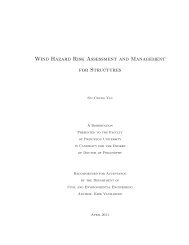Mental Health Nursing
Mental Health Nursing
Mental Health Nursing
Create successful ePaper yourself
Turn your PDF publications into a flip-book with our unique Google optimized e-Paper software.
to establish a link between EPS and compliance in patients receiving<br />
long-term anti-psychotic treatment.<br />
There is some evidence that a number of other factors may influence<br />
compliance: McEvoy et al. (1989) suggested that compliance was substantially<br />
higher in patients whose medication was supervised by a family<br />
member; Swofford et al. (1996) found that compliance rates were much<br />
lower in patients with a co-morbid substance misuse diagnosis. Other<br />
factors that are suggested within the literature as affecting compliance, but<br />
that lack any empirical evidence, include the complexity of treatment<br />
regimes (Parkin et al., 1976) and the patient’s socio-cultural background<br />
(Piatkowska and Farnill, 1992).<br />
Factors that enhance compliance<br />
Adams and Howe (1993) examined factors that were likely to predict<br />
good compliance in 44 psychotic in-patients. The greater the number of<br />
indirect benefits of medication (i.e., ‘keeps me out of hospital’ or ‘it<br />
allows me to make new friends’), the more compliant patients were.<br />
Similar results were reported by Chan (1984) who observed that compliant<br />
patients had generally derived positive benefits from medication.<br />
Addressing insight, beliefs about treatment, side-effects and the other<br />
factors that influence compliance may improve compliance, and consequently<br />
the health, of people with schizophrenia.<br />
Summary of reasons why patients do not comply<br />
Medication management 225<br />
• Antipsychotic medication does not achieve its clinical potential.<br />
• Fifty per cent of patients are non-compliant with medication.<br />
• Factors that affect compliance include patients’ awareness of their illness,<br />
their beliefs about treatment, the side-effects they experience<br />
from medication and their use of non-prescribed substances.<br />
Assessment of factors that affect compliance<br />
As the previous section demonstrated, there is a high level of noncompliance<br />
with medication. Three specific issues were identified as being<br />
relevant: insight into their illness, beliefs about treatment and side-effects<br />
of anti-psychotic medication. Measures are available that allow these<br />
issues to be quantified in a way that is both valid and reliable, however.<br />
Consequently, careful assessment of these factors will provide an important<br />
basis from which interventions may develop to increase compliance.
















